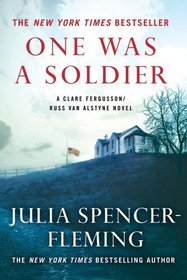As with the previous, it's a pretty fast read. I liked how the surviving members of the veteran's support group turned into amateur investigators, and I liked how the group leader was continually working to regain control of the group from Clare. It was easy to sympathize with Clare's struggles and her insistence that the other veteran did not commit suicide, and I liked how Spencer-Fleming ended that part of the plot. I also thought that Clare was more thoughtful in how she handled things this time, instead of impulsively leaping into the middle of a situation that was guaranteed to devolve around her. But there's not a lot about her duties as the priest - shouldn't she be busier? And the last paragraph! I didn't like that for a couple reasons. This is a re-read for me, although I didn't remember it at all, and that bit was startling.
I have been a devoted fan of Julia Spencer-Fleming since I first discovered her books. This is perhaps her best so far, with the pressures facing veterans after returning from conflict thoughtfully and realistically expressed. So if you are a fan, this one definitely doesn't disappoint.
This seventh book in a wonderful series is quieter and much more personal than the rest have been, but it deals with some very serious subject matter. First and foremost is Post Traumatic Stress Disorder. Each of the five vets attending the group therapy sessions suffers from it, and each one's symptoms are different. Throughout the series, the Reverend Clare Fergusson has been a rock, someone others look up to in times of need. To have her suffer from PTSD and to show her coping with it in very inappropriate ways brings home how serious the disorder is. Readers have already grown to care deeply about Clare, so their sympathy and understanding is more or less guaranteed. By their very proximity, the other four veterans are brought in under the umbrella of understanding that has been extended to Clare.
The lives of the characters also progress in this book, including my favorite, Hadley Knox. Hadley's been thrown into an occupation that she thinks she is very ill-qualified for, but she's determined to do the best that she can for her children, and being a police officer brings in the money that she needs. What she can't see (and we can) is that she's better qualified than she thinks, and I always enjoy the scenes in which she appears.
With all this talk of PTSD and characters' personal lives, you might think that the mystery isn't up to the author's usual high standards. Nothing could be further from the truth. Not only are our favorite characters' lives moving forward, One Was a Soldier also has a first-rate investigation that kept me guessing throughout. One more book, and I'll be current... unless Spencer-Fleming manages to get one step ahead of me!




![header=[] body=[Get a free book credit right now by joining the club and listing 5 books you have and are willing to share with other members!] Help icon](/images/question.gif?v=29befa08)
